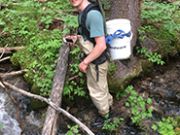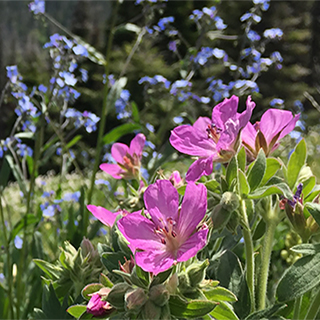People
Lab PI
-

Andrew Whiteley, PhD
Andrew Whiteley is an associate professor of fisheries and conservation genomics in the W.A. Franke College of Forestry and Conservation at the University of Montana. He is interested in how evolutionary and ecological processes interact to influence population persistence. His research involves using genetic and genomic tools to address questions about fish ecology, genomics and conservation. He hopes his work will help guide management and conservation efforts. Whitely received a B.A. in biology from Northwestern University and completed his PhD in Fred Allendorf’s lab at the University of Montana in 2005 (co-advised by Paul Spruell). He has previously been a postdoctoral researcher in Louis Bernatchez’s lab at Université Laval in Quebec City and David Tallmon’s lab at the University of Alaska Southeast in Juneau, Alaska. He was also an assistant professor at the University of Massachusetts Amherst from 2009 to 2015. He returned to UM in 2016. Contact Andrew at andrew.whiteley@umontana.edu or 406-243-6334 or view his CV (pdf).
Graduate Students
-

Donovan Bell, PhD candidate, Fish and Wildlife Biology
Originally, from Juneau, Alaska, Donovan Bell is interested in ecology and evolution, especially in small, isolated populations. His research examines how gene flow influences the population dynamics and persistence of above barrier headwater salmonid populations. Although his research currently focuses on fish, Bell is fascinated by diverse taxonomic groups. He enjoys running, rock climbing and biking in his spare time.
-

Kaeli Davenport, PhD student, Fish and Wildlife Biology
Originally from Spokane, Washington, Kaeli Davenport comes to Missoula from Eastern Washington University, where she earned a master’s degree in biology. She is currently working with brook trout, an invasive fish to the western part of the United States, and is interested in looking into their life history, plasticity and different ways they adjust to new environments. Her current research focuses on using genetic structure of populations and genetic monitoring to help inform management decisions of invasive fish. She is also working on testing the fitness of YY male brook trout, a novel approach that might help eradicate introduced populations.
-

Zak Robinson, PhD candidate, Fish and Wildlife Biology
Zak Robinson’s research focuses on the eco-evolutionary implications of small population size and the relationship between individual fitness, demographic vital rates and gene flow within a metapopulation context. The first half of his dissertation research evaluates the relationship of a demogenetic parameter to habitat characteristics and its potential for monitoring fragmented brook trout populations in their native range. The second portion evaluates the multigenerational effects of a genetic rescue attempt in isolated populations of brook trout. Originally from Bristol, Virginia, Robinson holds a bachelor’s degree in biology from James Madison University and a master’s in wildlife, fish and conservation biology from the University of Massachusetts Amherst. While operating at the intersection of ecology and evolution, he hopes to obtain valuable insights for the conservation of small populations. In his free time, he enjoys fly-fishing, mountain biking, rock climbing and an occasional unicycle ride.
-

Anthony Dangora, M.S. student, Wildlife Biology (co-advised with Lisa Eby)
Anthony Dangora grew up in Billerica, Massachusetts, but spent most of his time exploring the White Mountains of New Hampshire and coastal Maine. He earned a B.S. in environmental conservation with a concentration in fisheries ecology and conservation from the University of Massachusetts Amherst. Co-advised by Andrew Whiteley and Lisa Eby, Dangora works with the Confederated Salish Kootenai Tribes on westslope cutthroat trout management in the Jocko River watershed, focusing on the temporal and spatial patterns of introgression of westslope cutthroat trout and non-native rainbow trout. His research focuses on the genetic impacts of barriers to migratory life history traits on a population, in addition to exploring the mechanistic drivers influencing the survival of larval Oncorhynchus (and their hybrids) during early life history. He loves getting outside, whether that means by foot, skis, bike or raft.
Former Students
Dana Weigel (former Postdoctoral Scientist)
Stephen Jane (former M.S. student)
Matt Cembrola (former M.S. student)
Katerine Terkanian (former M.S. student)
Meghna Marjadi (former M.S. student)
Sevan Suni (former UMass Amherst Darwin Fellow)
